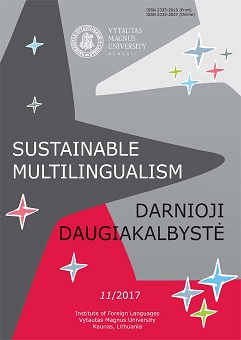TV serialo „draugai“ humoro ir jo vertimo į lietuvių kalbą analizė
Analysis of Humour in TV Series Friends and its Translation into Lithuanian
Author(s): Julija Korostenskienė, Miglé PakrosnytėSubject(s): Descriptive linguistics, Sociology of Culture, Film / Cinema / Cinematography, Translation Studies
Published by: Vytauto Didžiojo Universitetas
Keywords: humour; translation; TV series; script; incongruity; culture-specific;
Summary/Abstract: The present study examines humour in the tenth season of the TV sitcom Friends and its translation from English into Lithuanian. With humour often believed to be culture-specific, humour translation presents a notorious issue in translation practice, as jocular content in the target language is often criticised for being poor and vague. Grounded in Raskin’s (1985) theory of verbal humour and adopting Schjoldager’s (2008) inventory of translation microstrategies, the article examines the components and mechanisms of humour in the source language and analyses the strategies applied to humour translation, focusing on whether the intended humorous effect is preserved in the target language. The article also seeks to establish to what extent humour as used in Friends is culture-dependent. The study was conducted at two levels. First, we briefly presented the essence of Raskin’s model of humour, which centres around the notions of script and incongruity, and later applied it to the selected series to identify and analyse the data in the source language. We then supplemented the findings with the identification of jokes in the target language and assessment of translation microstrategies employed in rendering humorous instances in Lithuanian. The findings of the study are believed to further the theoretical and practical domains of translation from English into Lithuanian in particular and, more broadly, contribute to the discussion on the culture-specific worldview.
Journal: Darnioji daugiakalbystė
- Issue Year: 2017
- Issue No: 11
- Page Range: 155-178
- Page Count: 24
- Language: English

